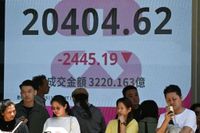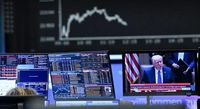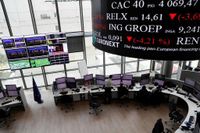On April 7, 2025, small investors in Hong Kong faced a devastating blow as the Hang Seng index plummeted by 13.22%, marking its largest drop since the Asian financial crisis of 1997. This dramatic decline came in the wake of tariff hikes imposed by U.S. President Donald Trump and retaliatory measures from Beijing. The ripple effects were felt across Asia, with other markets also experiencing significant losses: Taiwan's index fell by 9.7%, Shenzhen by 9.66%, Tokyo by 7.8%, Shanghai by 7.34%, and Seoul by 5.6%.
In a brokerage house in Hong Kong's financial district, a group of over a dozen investors watched in despair as red numbers flashed across their screens. "We are all losing money," lamented Lee, a retiree. The sentiment echoed throughout the city, where a 2023 study revealed that 48% of respondents had held or traded shares in the previous year. Among the most affected was 90-year-old Tam, who lost 200,000 Hong Kong dollars (approximately 23,000 euros) due to the market's downturn. "I hate Trump. He has cost me so much!" she exclaimed, highlighting the personal toll of the escalating trade war.
None of the 83 stocks comprising the Hang Seng index escaped the day's losses, with technology giants Lenovo Group and Alibaba Group suffering the most, down 23% and 18%, respectively. Stanley Chik, an expert at Bright Smart Securities, noted that the resumption of trading in Hong Kong after a three-day pause exacerbated the decline. He stated, "It is rare to see such widespread losses on the Hong Kong Stock Exchange, which have wiped out the index's gains from the first quarter of the year." Investors had taken a wait-and-see approach as Trump finalized his trade policies, but the mood was not yet one of despair.
One investor, 35-year-old Tsang, reported a loss of approximately 12,900 dollars (11,740 euros) in long-term investments. Despite the losses, he held off on selling, expressing hope that Chinese stocks might prove more resilient. "In this kind of conflict, it’s hard to say who will suffer the most," he reflected. Conversely, Ray Chan, a 30-year-old lawyer, managed to profit from the market's downturn by selling all his shares in Hong Kong and the U.S. two weeks prior, realizing seven-figure gains. "I anticipated the market turning when Trump announced the tariff hikes on April 2," Chan explained, adding that he plans to wait at least a year before investing again.
The turmoil wasn't limited to Hong Kong. European stock exchanges opened to significant declines on the same day, as investors reacted to Trump's unwavering stance on tariffs. In Frankfurt, the stock exchange dropped by 5.75% after briefly falling over 10%. Paris followed suit with a 5.68% decline, while London, Milan, and the Swiss stock exchange saw decreases of 5.21%, 6.37%, and 6.51%, respectively. This downward trend mirrored the chaos in Asian markets, which were already reeling from the fallout of Trump's trade policies.
Economists at Deutsche Bank characterized the situation as potentially the "biggest shock to the global trading system since the collapse of Bretton Woods" in 1971. The announcement of new tariffs by Trump on April 2 had been described as the beginning of a "historic sale on financial markets," with analysts warning of severe ramifications for global trade. Trump defended his actions, stating during a press conference, "Sometimes it is necessary to take treatment to heal," in response to the violent market reactions.
The White House indicated that over 50 countries had contacted the U.S. administration to negotiate the tariffs, which have not been seen since the 1930s. The proposed tariffs included an additional 10% floor rate, with specific increases for different regions: 20% for the European Union, 34% for China, 24% for Japan, and 31% for Switzerland. This aggressive stance has left many investors on edge, uncertain about the future of their investments and the broader implications for the global economy.
As the financial world grapples with the fallout from these developments, the mood among investors remains tense. While some, like Chan, have managed to navigate these turbulent waters, many others are left counting their losses and wondering what the future holds. The ongoing trade tensions between the U.S. and China continue to cast a long shadow over the markets, leaving analysts and investors alike searching for clarity amid the chaos.
In summary, the events of April 7, 2025, serve as a stark reminder of the interconnectedness of global markets and the profound impact that political decisions can have on individual investors and economies worldwide. As the situation continues to evolve, the financial community watches closely, hoping for a resolution that will restore stability and confidence in the markets.







